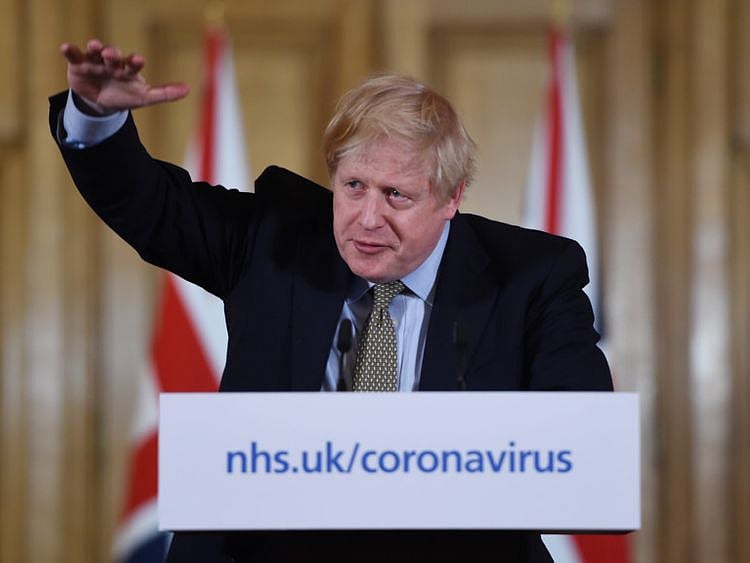Why Britain’s economy is facing a double whammy
Johnson may have no other choice but to extend the transition period until end of 2021

The coronavirus is having an very dramatic effect on every aspect of life in Europe. Across the EU, nations are in shutdown, fines are imposed for being out of doors without authorisation in Italy, Spain and France, and the very notion of the free movement of people has been shelved until the end of March at the earliest — likely for a lot longer.
This is not the EU that anyone could have imagined. But it is an EU that has the power to act together to provide stimuli to the world’s third-largest economy and marketplace for more than 500 million people.
And now, of course, that the United Kingdom is no longer part of the club of 27, it is very much on its own — it no longer has access to those economic stimuli and its taxpayers will inevitably have to bear the brunt of funding whatever measures are necessary to kick-start its national economy once the worst of this crisis is over. And that, all experts agree, will take months.
Best-possible scenario
So, let’s assume that these experts are right, and there’s a best-possible scenario that Britain is on the far side of this crisis by the back end of July. Why July?
Well, one of the suggestions from UK public health officials is that those most at risk from Covid-19, the over-70s, will be required to self-isolate for up to four months.
It’s hard, therefore, to assume that the economy will be fully recovered by then when the senior segment of society is locked away in their homes and flats until then. So that’s why the back end of July seems not unreasonable.
And that will mean there are just five months left for the UK and the EU to reach a free trade deal that sets out the future trading relationship between Britain and that market of more than 500 million.
The impact of coronavirus
British Prime Minister Boris Johnson, in the weeks after winning his super-majority in last December’s general election and fulfilling his promise to get Brexit done by the end of January, has also put himself in a corner by passing a law that limits the transition period with the EU until the end of December, 2020.
Like everyone else, no one could have predicted what was about to happen to the global economy with the impact of coronavirus.
But now Boris and Britain are backed into a corner of their own making, that leaves the UK economy vulnerable to the effects of World Trade Organisation tariffs and a knock-on effect on British jobs, companies and workplaces should Brussels and London not reach a free-trade agreement.
And because of coronavirus, Boris has very little room for bluster or to manoeuvre. His nation’s economy will be infected by Covid-19 and then faces a severe relapse should those WTO rules come into effect.
Without doubt, the political and economic pressure on Boris will mean his negotiators might make all of the sounds of public grandstanding while privately fretting over a looming nightmare scenario.
Those talks are still going ahead through videoconferencing and other means — but the EU’s full attention will be on ensuring the economic strength and recovery of the EU, not on dealing with the whims of a nation who decided to walk away from the club, come what may.
Boris slow to respond
As far as the EU is concerned, the terms of the Withdrawal Agreement reached with London does allow for an extension of the transition period until the end of December 2021.
For that clause to be triggered, the UK will have to request it by the end of July. But under the bills passed at Westminster in the heady days of Boris’ post-election honeymoon, the UK government cannot request an extension.
As things stand now, critics in the UK suggest that Johnson’s government has been slow to react to the coronavirus and is lagging behind the efforts of EU nations to flatten out the so-called curve in the fighting the bug.
Its schools are still open, horse racing has only just suspended its meetings, and there’s a general sense of things being abnormal — just not like the siege mentality that is being forged in Spain, Italy, Germany, Ireland, Denmark and elsewhere across the political and social bloc.
Because, for example, the UK is no longer a member of the European Medical Agency, it no longer has access to the technical biomedical advice that is shared by the EU members on how this pandemic spreads. That is one price of deciding to opt out of Europe and go it alone.
It must surely only be a matter of time — when revenues coming into the UK exchequer are falling fast and when spending demands are significantly increased to try and provide recover measures for the British economy — that Boris will need to extend the transition period.
Network Links
GN StoreDownload our app
© Al Nisr Publishing LLC 2026. All rights reserved.